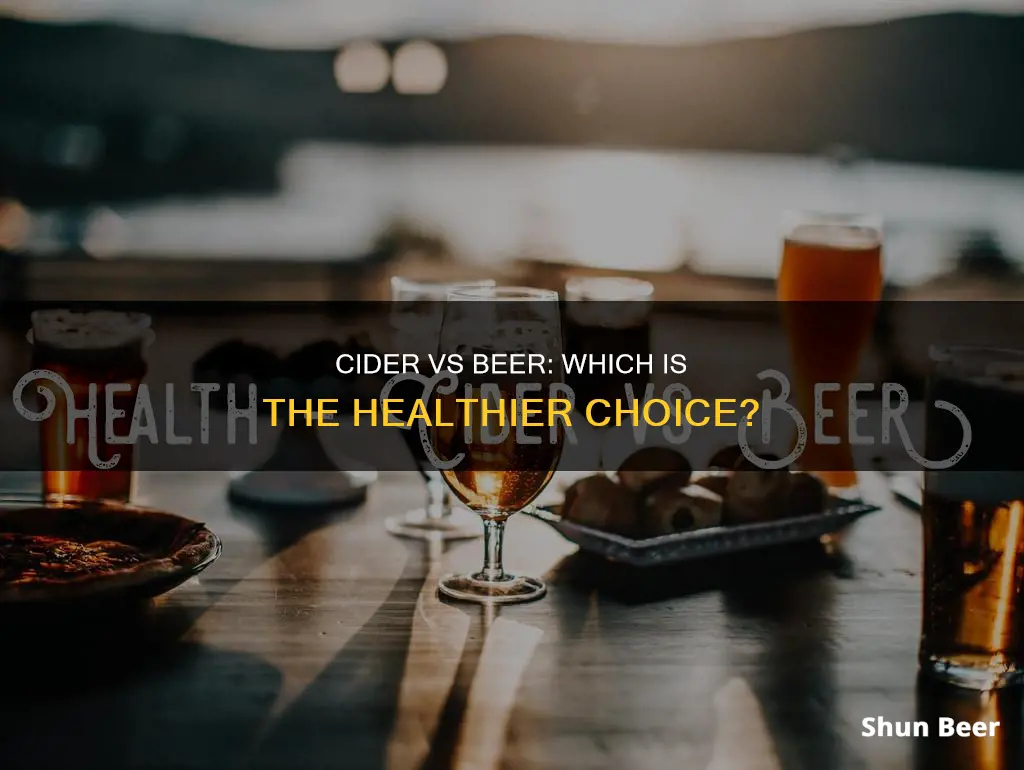
Beer and cider are two of the most popular alcoholic beverages worldwide, but which is healthier? Both drinks have their pros and cons when it comes to health. Beer is typically lower in sugar and calories than cider, which can contain as many calories as a sugared donut. However, cider is gluten-free, making it a good option for those with gluten allergies or celiac disease. Beer also contains vitamins and minerals such as magnesium, potassium, and B vitamins, while cider contains vitamin C and antioxidants. Research has also shown that moderate consumption of beer or cider can reduce the risk of heart disease. So, when it comes to health, it's a close call between beer and cider.
What You'll Learn

Beer has fewer calories and carbs than cider
Beer and cider are two of the most popular alcoholic drinks in the UK. While neither drink is particularly healthy, beer does have fewer calories and carbs than cider, which can make it a slightly healthier option.
Beer is typically made from water, wheat or barley, fermenting yeast, and flavouring agents like hops. Cider, on the other hand, is made by fermenting fruit, usually apples, with sugar and yeast. This key difference in ingredients leads to variations in the nutritional content of the two drinks.
Beer is generally lower in calories than cider. A pint of beer typically contains around 188-254 calories, while a pint of cider can have anywhere from 225-300 calories. That's the same amount of calories as a sugared donut!
Beer also tends to have fewer carbohydrates than cider. This is because cider contains more sugar, as the fruit used to make it is naturally full of it. Commercial ciders also often have added sugar to make them taste sweeter. As a result, ciders can have significantly more carbs than beers, which can be a concern for those watching their waistline or following a low-carb diet.
However, it's important to note that the specific nutritional content of beer and cider can vary depending on the brand, style, and ingredients used. For example, craft beers tend to have more calories and carbs than regular beers, and dryer ciders will have less sugar and therefore fewer carbs. Additionally, the health benefits of beer and cider go beyond just calories and carbs. Both drinks have been found to have potential health benefits, such as reducing the risk of heart disease and improving digestion. Ultimately, the healthiest option is to drink in moderation, regardless of whether you choose beer or cider.
Beer and Health: Is NA Beer a Healthy Alternative?
You may want to see also

Cider is gluten-free, beer is not
Cider and beer are not typically thought of as healthy beverages. However, drinking the right types of cider and beer can help minimise the impacts of alcohol on the body.
Cider is a gluten-free alcoholic drink. It is made from apples or other fruit, which are naturally gluten-free. Cider is also made without wheat or barley, which are gluten-containing grains. For this reason, cider is a good alternative for those who are gluten intolerant or have coeliac disease. However, it is important to check the label for other additives or flavourings that may contain gluten.
Beer, on the other hand, is not gluten-free. It is made from water, wheat or barley, fermenting yeast, and flavouring agents like hops. Most beers available on the market are not gluten-free. Therefore, for those with a gluten allergy, coeliac disease, or a gluten intolerance, beer may be a nasty affair.
There are two types of gluten-free beer: naturally gluten-free beer and gluten-removed gluten-free beer. However, even if you opt for a gluten-free beer, you must still check the label carefully. Beer can only be labelled as gluten-free if it contains 20ppm or less of gluten. Therefore, there may still be traces of gluten in the beer, which could cause a reaction in those with severe gluten sensitivity.
In summary, cider is a gluten-free alternative to beer. Beer is not gluten-free and may not be suitable for those with a gluten intolerance or coeliac disease.
The Pros and Cons of IPA Beer Consumption
You may want to see also

Beer is sugar-free, cider is not
Beer and cider are not typically the first drinks that come to mind when considering healthy beverage options. However, some research indicates that drinking certain types of cider and beer can minimise the impacts of alcohol on the body.
Beer is often touted as being sugar-free, with labels claiming "This beer is 99% sugar-free". While this statement may seem nonsensical, it is technically true. Beer does not contain much sugar, if any at all, and it never has. A 330ml bottle of beer typically contains one gram or less of sugar. This is because yeast, a key ingredient in beer, consumes sugar during the fermentation process, converting it into alcohol.
On the other hand, cider is known to contain sugar. The amount of sugar in cider can vary depending on the style and brand. For example, a pint of fully fermented dry cider will contain no sugar at all, while commercial ciders often add extra sugar to appeal to sweeter palettes. As a result, a pint of cider can contain as many calories as a sugared donut!
Bulmers Toffee Apple cider, for instance, contains 12.1 grams of sugar per 100ml, which is more than a bottle of Coca-Cola. In contrast, Stowford Press cider contains only 1 gram of sugar per 100ml, resulting in a pint containing only 6 grams of sugar.
Therefore, when it comes to sugar content, beer is the undisputed winner. Cider, especially commercial varieties, tends to have more sugar and, consequently, more carbs than beer, making beer the slightly "healthier" option in this regard.
However, it is important to remember that the health implications of alcohol go beyond sugar content. Alcohol itself has nearly twice the energy of sugar, and it is this, along with excessive calorie intake, that contributes to weight gain and other health issues.
So, while beer may be sugar-free, it is not necessarily a healthier option than cider due to its alcohol content. As always, moderation is key when consuming alcohol, regardless of whether you choose beer or cider.
Hard Seltzer vs Beer: Which is the Healthier Choice?
You may want to see also

Cider contains vitamin C, beer does not
Cider and beer are not the first beverages that come to mind when discussing health and nutrition. However, some research indicates that drinking certain types of cider and beer can minimise the negative impacts of alcohol on the body.
Cider is made from apples, and apples are a source of vitamin C. Therefore, cider contains vitamin C, whereas beer does not. Vitamin C is known for its health benefits, including strengthening the immune system and boosting one's mood.
In addition to vitamin C, cider also contains pectin, B vitamins, biotin, and folic acid. Beer, on the other hand, is rich in magnesium, potassium, and B vitamins.
When it comes to sugar content, beer typically contains little to no added sugar, resulting in lower carbohydrate levels compared to cider. Commercial ciders often add extra sugar to appeal to consumers who prefer sweeter drinks, which increases the overall carbohydrate content.
While cider has an edge over beer in terms of vitamin C content and being gluten-free, beer has its advantages in lower sugar and carbohydrate levels. Ultimately, both beverages have their unique nutritional profiles, and the choice between the two depends on individual preferences and specific nutritional needs.
Bitter Beers: Health Benefits or Just a Fad?
You may want to see also

Both drinks have similar antioxidant levels
Cider and beer are not the first drinks that come to mind when discussing healthy beverages. However, some research indicates that drinking the right types of cider and beer minimises the impacts of alcohol on the body.
Cider is made by fermenting fruit with sugar and yeast. Often, apples are used, which provide antioxidants like vitamin C. Beer is made with yeast, hops, water, and cereals, which give it a variety of vitamins, minerals, and antioxidants.
The antioxidant content of cider varies by apple type. If a manufacturer uses a polyphenol-poor variety, you'll need to drink more to reap the potential health benefits. Although beer is low in polyphenols, its nutritional value is enhanced by high levels of nutrients like vitamin B, potassium, and folate.
Beer for Hair: Healthy Shine or Foamy Disaster?
You may want to see also
Frequently asked questions
It depends. Beer has fewer calories and carbs than cider, but cider has more vitamin C and is gluten-free. Both drinks have similar antioxidant levels, but cider has more polyphenols, which improve blood pressure and cholesterol.
Cider contains polyphenols, which are natural compounds that improve blood pressure and cholesterol. It also contains vitamin C and antioxidants, which may help protect against certain types of cancer. The acid in cider also promotes iron absorption, which fuels your muscles with oxygen during exercise.
Beer is rich in vitamins and minerals, including magnesium, potassium, and B vitamins. It also contains antioxidants, which may help reduce the risk of heart disease. In addition, beer can help clear mental blocks and improve problem-solving abilities.







